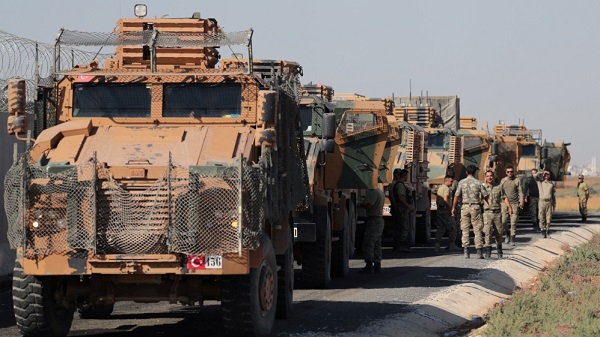Alwaght- The Syrian crisis is now seeing a calm before the storm. A several-month calm to prove that the political agreements are failing and that a military action led by the central government to force the terrorist groups out of the country and unite the whole territories of Syria under the legitimate government for moving towards post-crisis reconstruction and return of the refugees is unavoidable.
In the heart of the Syrian crisis stands Idlib. Idlib issue remains unresolved so far and certainly the most important scene of the conflict in the Arab country in the forthcoming months will be this northwestern province. The military arrangements and the amassment of forces of the involved parties in recent days bear witness to their preparation to face this reality.
Three months after March agreement on Idlib between Russia and Turkey, Russian fighter jets struck on Thursday terrorist positions in Idlib, the last major stronghold of the foreign-backed terrorists. The air raid followed attacks by, according to the Syrian Observatory for Human Rights, Horas Al-Din terrorist militia on Al-Fatatrah and Al-Manarah villages in Sahl Al-Ghab northwest of Hama province. The attacks killed 19 Syrian army soldiers. 22 terrorist fighters were killed in response to the attack. In recent weeks, the ceasefire was violated by the militants repeatedly.
On the other side, the opposition activists reported that both Turkey and the Syrian government have been sending forces and equipment to the northwestern fronts.
This week, informed sources said that a Russian naval vessel carrying tanks and other armored equipment to arm the Syrian forces sailed through Bosporus Strait towards Eastern Mediterranean, bound for Tartus Port in Western Syria. Reports suggest that the Russian arms delivery is meant to mend the Syrian combat capabilities because a number of Syrian armored vehicles were destroyed in a Turkish attack in March. But so far, neither Russia nor Syria has confirmed the tank delivery reports.
Furthermore, Russia has delivered to the Syrian Air force two squadrons of the modern SU-29 fighter jets to improve Damascus air power. Additionally, fresh forces from the army, National Defense Forces, and voluntary forces from allied sides were deployed to the contact lines with the terrorist-held territories in the southern parts of Idlib and are reportedly put on high alert.
In recent days, footages of Turkish Atilgan air defense systems moving to Idlib were circulated online. The system not only can target drones but also Russian fighter jets. Later in March, Turkey also dispatched American-made Hawk MIM-23 air defense batteries to Taftanaz airport in the northwest of Idlib.
Also, on Monday, a Turkish army convoy comprising 30 armored vehicles and equipment along with trucks and troops arrived at the Turkish military bases in Idlib. Turkey strengthened its watch posts in various Idlib areas in a move to boost support to the Idlib-based terrorists in the face of possible attacks by the Syrian forces.
Still, the Syrian army attacks in February undermined the Turkish logistical capabilities there. The attacks killed at least 62 Turkish troopers, wounded 100 others, destroyed tens of armored vehicles, and downed over 10 drones.
What is clear is that Turkey wants to give its toehold in northwestern Syria a boost so that it can through prolonging the Idlib crisis pursue its plans for the occupied areas in the north and northeast that include demographic changes and expansionist ambition in the Syrian territories.
According to a Turkish-Russian deal in 2018, terrorist groups had to be withdrawn from Idlib. But Turkey neither wanted nor could implement the agreement.
The Turkish President Recep Tayyip Erdogan’s failure to stay committed to the agreements with Russia along with the current severe Russian-Turkish confrontation in Libya, where Turkey is helping the Government of National Accord (GNA) to push back the Russian-Saudi-Emirati-backed General Khalifa Haftar who has been pushing to seize the capital Tripoli, can persuade Moscow to join the forces with Syria and its allies for a showdown in Idlib.
The Turkish army’s engagement in the Libyan crisis will certainly cut Ankara’s capability to provide cover to the terrorist fighters in Idlib. Moscow can retaliate the rejection of its calls for Libya truce by Erdogan in the form of cancelation of Idlib ceasefire which is frequently breached by the Turkish-supported militia groups.



























